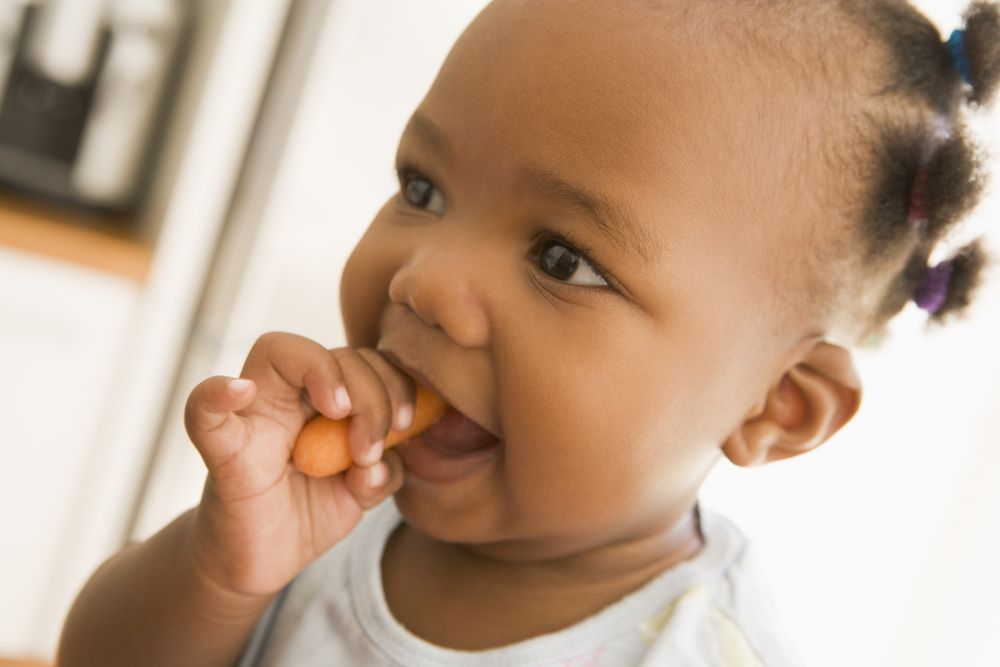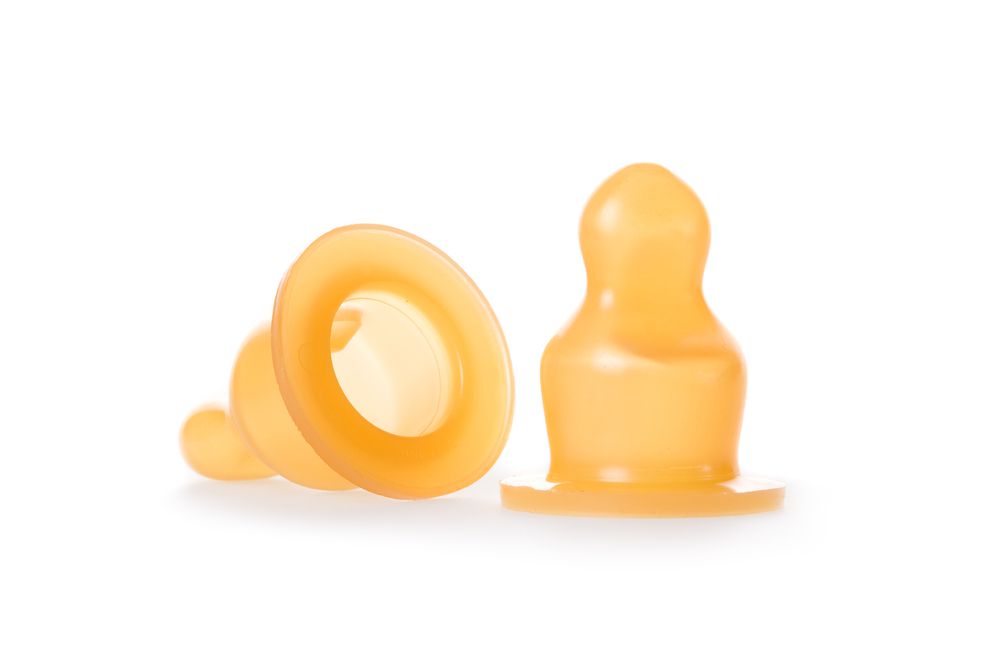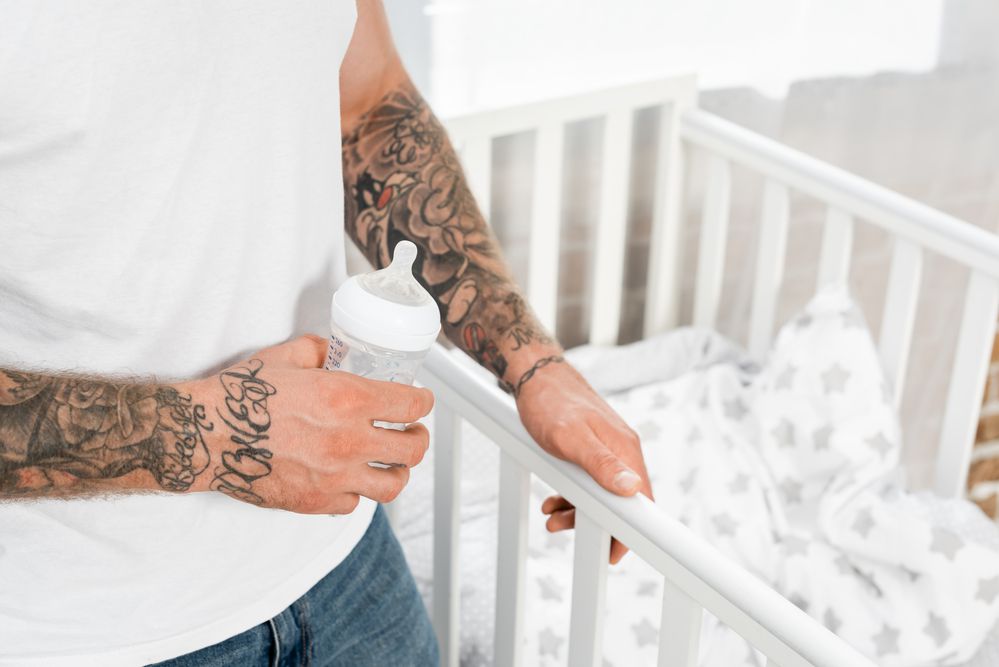It’s common for almost all babies to eventually go through a period of sudden, unexpected bottle refusal.
When bottle refusal happens, carefully identify the unique type of bottle refusal in your baby so you can problem solve based on whether your baby’s bottle refusal stems from preferring to breastfeed, a sudden illness, distraction, or nipple flow speed.
Jump to:
🤱 Your Baby Prefers to Nurse. 🙅♀️ Your Baby isn't Hungry. 🍼 Your Baby Wants a Different Nipple Flow. 🥛 The Milk Tastes Different. 😬 Your Baby is Teething. 🤒 Your Baby is Sick. 🤪 Your Baby is Distracted. ✔️ Step-By-Step Guide 💭 Final Thoughts
What causes an older baby to suddenly refuse to take a bottle?
How worried should you be and what can you do to help your baby start drinking from a bottle again?
These are the exact questions I was asking myself when my baby suddenly stopped taking the bottle with absolutely no warning.
So I spent hours pouring over every article and blog post I could find and talking with our pediatrician and lactation consultant to find out exactly what causes bottle refusal and how to fix it.
And then I put together all of my research on one place to help you problem solve your baby’s bottle refusal too. 😊
Keep reading to learn 7 reasons why your baby might suddenly refuse to drink from a bottle and get your step-by-step guide to finally figure out and problem solve your baby's specific bottle refusal.
DISCLOSURE: Piece of Cake Parenting is a participant in the Amazon Services LLC Associates Program, an affiliate advertising program. As an Amazon Associate, I earn from qualifying purchases. Read more about these links in my disclaimer policy.
Want a list of all of my favorite tools for overcoming bottle refusal? Click here!
1. Your Baby Prefers to Nurse
If you’re breastfeeding and bottle feeding, it is super common for your baby to refuse to take a bottle because they prefer to nurse. In fact, this is the number one cause of bottle refusal for many breastfeeding families.
And it totally makes sense.
While breastfeeding, your baby creates a special bond with you. They associate eating with this special bonding time and will often want to cuddle and nurse rather than take a bottle.

Although your baby may have taken a bottle without problems before, it’s common for breastfed babies to go through increased periods of bottle refusal when they’re going through a growth spurt or need a little extra love.
Many moms also see an increase in bottle refusal and nursing much more frequently in the evenings after starting day care.
This is obviously stressful since you worry about your baby refusing to eat while you’re gone. But it’s completely normal for your baby to drink just enough throughout the day to top off their hunger and then wait to squeeze in lots of nursing sessions once you’re together again in the evening.
Pro-Tip: If your baby starts to show a strong preference for nursing and refuses to take a bottle from you, try to have someone else give the bottle. Your baby has a strong sense of smell and can smell your milk on you. Because of this, she is more likely to refuse to drink a bottle from you than when other people offer it.
Related: Use these 7 steps to help your breastfed baby love bottle feeding just as much as the breast.
2. Your Baby Isn’t Hungry.
We started introducing food at 6 months and instantly our baby fell in love with eating solid food. His eyes light up every time he gets to sit in his highchair and eat meals with us. But as he started eating more food, he also started to refuse his bottle.
Again, this is normal! Once your baby starts eating more solid food, they won’t need as many calories from milk. They’ll naturally decrease milk consumption as they take in more and more calories from solid food.

If you try to offer your baby a bottle when she’s already full, she’s much more likely to refuse it than if you offer it when she’s hungry.
Don’t ever force your baby to drink from her bottle if she isn’t hungry. This can be frustrating for her and can cause stomach discomfort if she becomes overly full. Instead, take a break and offer a bottle in a little bit.
Pro-Tip: If you're noticing significant bottle refusal after starting solid foods and your baby is less than 9 months old, nurse or offer a bottle before your baby sits down for a meal. This ensures that they continue to drink enough milk before filling their stomach with new foods.
Starting Solids? If you want to know exactly what to expect and how to help your baby’s eating skills advance faster than you thought possible, check out this amazing course! (It is the BEST investment we made for our child and it is so affordable!)
3. Your Baby Wants a Different Nipple Flow.
I typically recommend giving your baby a bottle with the slowest flow that they’ll take. This helps to avoid challenges with acid reflux and better paces your baby so they aren’t drinking so quickly.

However, as your baby gets older, they may become frustrated with the “slow flow” nipples.
This is because your baby becomes much more efficient at drinking milk and may want to take in more milk at once. Sometimes switching to a faster flow nipple can reduce their frustrations and help to start taking a bottle better again.
⭐ Pro-Tip: Although your baby might be ready for a faster flow, continue to practice paced bottle feeding. Also, only increase your nipple flow as much as your baby needs it. Also, avoid immediately skipping from a slow flow nipple to a fast flow one. Instead try the medium flow first and stick with that if your baby is doing well.
4. The Milk Tastes Different.
Your baby might have been drinking from a bottle without any problems but then suddenly start refusing the bottle because of differences in the milk.
Because when you make a bottle, there are several factors that could change how much your baby enjoys the milk.
If your baby is finicky, they may like a very specific temperature for their milk. When it’s too warm or too cold, they can be more likely to refuse his bottle. (This is a great bottle warmer to make sure you always have the same bottle temperature!)

If you’re giving formula, changes in type or brand can also taste different and lead your baby to refuse to drink it.
Likewise, if you’re not super precise while you measure the milk, the ratio could be a little different and your baby might refuse to drink the milk when it’s more or less diluted. (If you think this is causing your baby’s bottle refusal, check out this automatic formula maker. It mixes your formula so you always have the same mix and temperature.)
Finally, if you’re giving frozen breast milk, there are several changes that can occur during the freezing and thawing process that might cause your baby to start refusing the bottle.
One common concern is having excess lipase in the milk. Over time, this breaks down the fats in milk and can cause the milk to taste “soapy,” which some babies will refuse to drink.
Pro-Tip: If your baby starts refusing to drink a bottle, think about what changes could have occurred with your formula brand or frozen breast milk. Carefully measure out your formula or experiment with the milk temperature. You can also try mixing freshly expressed milk with thawed milk to see if your baby will drink it better that way.
5. Your Baby is Teething.
Teething is the worst!
Our baby got his first tooth at 4.5 months and now has 7 teeth at almost 8 months. Every time he is teething, I feel so bad for him. It’s clear that he’s feeling uncomfortable and in pain as he waits for those teeth to pop through.
Unfortunately, the sucking motion while drinking a bottle can often put extra pressure and pain on your baby’s gum. I’ve also heard from several moms that teething pain is worse when babies are laying down than when they are elevated.
This means that it’s pretty common for babies to refuse to lay down and drink from a bottle while they are teething.

The good news is that those teeth will eventually pop through and your baby will feel tons of relief once that happens.
The bad news is that sometimes it feels like the teeth take ages to come in.
Try to find teething remedies that help relieve as much pain as possible for your baby. A few options include giving your baby teething toys to chew on, rubbing and massaging their gums with your finger, applying teething gel to her gums, or giving pain medications. Also, try feeding the bottle in a more seated position to prevent extra pain from reclining your baby to eat.
If you can help minimize your baby’s pain and discomfort, they are much more likely to stop refusing the bottle and drink more milk for you.
Pro-Tip: Milk popsicles are great for relieving pain from teething while also helping your baby to take in some milk. If you’re worried your baby isn’t taking in enough milk, you can make a few milk popsicles and then offer them to your baby while they're teething and refusing a bottle.
Click here to check out the best tools for finally overcoming bottle refusal with your baby!
6. Your Baby is Sick.
When you don’t feel well, you typically don’t feel like eating as much. Likewise, when your baby isn’t feeling well, they are much more likely to suddenly start refusing to eat.
Do your best to comfort your baby when they aren’t feeling well and try to add in lots of extra snuggles.
Continue to offer a bottle as often as you can so that they don’t become dehydrated.
Dehydration is very serious in babies. If you are worried about your baby’s fluid intake, please call your doctor’s office for medical advice.
Again, do what you can to minimize the symptoms. If your baby has an upset stomach, avoid solid foods or stick to a bland diet until they are feeling better.
If they’re congested, try to keep their head elevated as much as possible and give a bottle at a more elevated angle to make it easier to breathe while taking a bottle.
7. Your Baby is Distracted.
The older your baby gets, the more easily distracted they become while eating. They want to be a part of the action and by golly don’t want to miss anything around them.
This often causes your baby to suddenly start to refuse to drink from a bottle because they are too distracted for milk.
We’ve noticed that our baby is much more likely to refuse a bottle when the TV is playing, when my husband and I are chatting, or when kids are playing around us.
In these situations, he is much more interested in looking around than drinking from his bottle.
If your baby suddenly starts refusing to take a bottle, I highly recommend that you try to minimize distractions while you offer the bottle. Consider stepping away to a different room with no extra noise or distractions.
Create a calming environment where your baby can quickly drink their bottle and then return to the fun to eat some solid food or spend time playing.
Final Thoughts:
It’s not uncommon for your baby to go through certain phases and refuse to drink from a bottle.
When this happens, try to take a step back and try to relax.
Your baby won’t starve from drinking a little less for a couple of days.
Try to pay close attention to what is going on with your baby and then experiment to see how you can help encourage your baby to start drinking from her bottle again.
In the meantime, you can add in extra nursing sessions if you are breastfeeding, offer a cup with milk, water, or juice, make milk popsicles, or give foods with a higher water content.
💬 Did your baby ever suddenly refuse to drink from the bottle? What tips helped you?
*Piece of Cake Parenting is a participant in the Amazon Services LLC Associates Program. As an Amazon Associate, I earn from qualifying purchases. Please visit Piece of Cake Parenting’s Terms of Service, Disclaimer, and Privacy Policy for more information.
